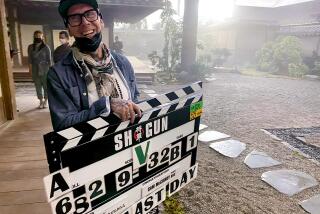Looking Back at Work of Kinji Fukasaku, Beyond ‘Green Slime’
TOKYO — Most Americans who are familiar with Japanese director Kinji Fukasaku know his cult favorite “Black Lizard” and cheesy sci-fi films such as “The Green Slime” and “Message From Space.”
In Japan, however, the prolific director is known for his broad range and innovative filmmaking. His 60 films, made over a four-decade career, cover everything from the code of conduct of organized criminals to World War II and its aftermath, the subtleties of Japanese male-female relationships and the essence of Japanese tradition.
Los Angeles viewers can see several of his less well-known films with the opening of an 11-day Fukasaku retrospective at the Egyptian Theatre that starts Thursday.
The first film that the Egyptian will screen is “Battle Royale,” Fukasaku’s latest work, released last month, about 42 junior high school students forced by the state to play a deadly game of kill or be killed.
This extremely violent film, marketed to teenagers, is controversial in Japan at a time when the nation has been hit by a wave of high-profile murders by juveniles. “Battle Royale” has been panned by a number of critics, including some who say they respect what he’s trying to do, but feel the characters and motives were poorly developed.
In an interview, the 70-year-old Fukasaku said over the years his critics have frequently made valid points about his work. But that said, as a director he must follow his own instincts.
The 15 films included in this retrospective were chosen in part because they translate well, he adds. Some of his films about the subtleties of Japanese romantic love, for instance, may be too culturally specific for non-Japanese viewers.
Other than the works of a few of Japan’s most famous directors, including Akira Kurosawa, Yasujiro Ozu, Nagisa Oshima and Kenji Mizoguchi, relatively few Japanese films have made it overseas. In large part, Fukasaku said, this reflects poor overseas marketing by Japanese film companies.
But growing interest in Asian films by U.S. moviegoers over the past couple of years could spur more interest, he added. “In the past, you couldn’t do any business because you had an Asian face, but this situation has really improved,” he said.
Among his favorite non-Japanese Asian directors are China’s Zhang Yimou, who made “Red Sorghum” and the “The Story of Qiu Jiu,” and Vietnam’s Tran Anh Hung, who made “Cyclo” and “The Scent of Green Papaya.”
Fukasaku is best known for his use of violence, although he says he went for two decades during the 1980s and 1990s without concentrating on violent themes in any of his movies. In making many of the war and yakuza (Japanese organized crime) films, he says, he drew on his own war-torn childhood, much of which dovetailed with Japan’s military aggression in East Asia.
Fukasaku is recognized at home as one of Japan’s top directors. Haruo Mizuno, a director, critic and television host, said he stands out among his peers for tackling pressing social issues, turning a critical eye on modern Japanese society and introducing new filming techniques. His “Honor and Humanity” yakuza series broke new ground by invigorating an old genre with characters facing 20th century problems and dilemmas. A crude analogy might be the HBO series “The Sopranos.”
“He’s a unique director,” Mizuno says. “His greatest skill is his ability to explore the diabolical side of human nature.”
Tetsuo Kogawa, media critic and media studies professor at Tokyo Keizai University, said Fukasaku’s “Battle Royale” is not necessarily his finest. While it is meant as a warning of how far Japanese society could deteriorate, it lacks believability or subtlety and is overly simplistic.
*
That said, like many of his other movies, Fukasaku has tried in “Battle Royale” to explore through violence issues of social control, authority and individuality, Kogawa says. This exploration arguably worked better in some of Fukasaku’s early yakuza movies, Kogawa believes, when the director showed how even organized crime was coming under the control of the state.
Fukasaku says as a filmmaker he spent much of the 1960s--a decade marked by the release of “Wolves, Pigs and People” in 1964 and “Black Lizard” in 1967--looking for suitable subjects and paying relatively little attention to technique. “It was a real period of trial and error for me,” he says.
By the 1970s, however, he had become more confident, and he started exploring more of the themes that would become his trademark in films such as “Under the Fluttering Military Flag” done in 1972 and his two dozen yakuza films, including “Battles Without Honor and Humanity,” released in 1973.
Fukasaku says he was particularly interested in Japan’s power structure. Because the Cold War came so quickly after the end of World War II and Japan was viewed by the Americans as a bulwark against communism in Asia, the American occupation force never pursued Japan’s ex-military leaders as thoroughly as the Allies rooted out former Nazis in Germany. Instead the U.S. chose to keep the imperial system in place, creating many contradictions--particularly for Japan’s youth. The 1970s also were a period of student movements and great social turmoil, he said, which heavily influenced his work at the time.
By the 1980s, Japanese viewers were getting tired of the burned-out cities and postwar black markets that had provided the backdrop for many of his earlier films. “The market was increasingly moving toward more feminine sensibilities,” he says. “I knew my old approach wouldn’t work.”
Much of the next two decades for Fukasaku were spent shooting movies that explored personal relationships and Japanese tradition themes--including his critically acclaimed “The Geisha House,” released in 1999--but with a twist.
Japanese dramas typically focused on the clear distinction between good and evil. Fukasaku sought a more ambiguous approach by exploring the juxtaposition of good and evil, often in the same character. “I had them wander back and forth, sort of wander around,” he says.
“Battle Royale” is a commercial success, but on the whole the Japanese film industry is having a hard time, with most viewers largely interested in Hollywood and other foreign films. Nor does Japan have as many financing options as the U.S., and independent filmmakers in Japan are almost nonexistent. While the nation’s big houses need reform, Fukasaku says, in practice it’s difficult to do. “We just have to keep on trying,” he said. “That’s the reality.”
Fukasaku said Japan was at war his entire childhood. It invaded China the year after he was born and surrendered when he was 15, so he never lived in a peaceful setting during these key years.
He’s always had a healthy skepticism of authority and adult society, given how badly they seemed to be messing things up as he was coming of age, he says. These were emotions he drew on in making “Battle Royale.”
“You could say my nucleus was a little twisted,” he said.
After World War II ended, he looked around for something to do. He opted out of school because the education system was in disarray and the teachers weren’t sure what they were supposed to teach. “So I went out and watched movies,” he says.
At the time, Japanese-made films, with their militaristic themes, were banned by the U.S. occupation force. So he started watching foreign films and quickly grew to like them.
Today, Japan is seeing a growing gulf between adults and children, he says. All too often, however, Japanese politicians and other authority figures view the problem in isolation and try to regulate it away by passing censorship laws. The ruling Liberal Democratic Party is particularly guilty of this, he says.
“There’s an arrogance in their nature,” he adds. “They think as long as they can regulate [youth violence], they can control it.”
But Japanese adults should look a bit closer at themselves and the legacy they’ve created, he said, including the nation’s many deeply entrenched economic, social and political problems. “These are adult problems,” he says. “Society is starting to break down, and schools are breaking down.”
Fukasaku says he feels burdened at times by the social problems he sees around him, but doesn’t feel comfortable revealing these thoughts to anyone, including actors or his production staff.
Making a film is sometimes compared to playing God. Directors create an entire worldview and control the actors, script, visual effects, background and story. “But there are a lot of different types of gods,” he says. “I’d be like a god with lots of worries that keeps reviewing what I’m doing.”
More to Read
Only good movies
Get the Indie Focus newsletter, Mark Olsen's weekly guide to the world of cinema.
You may occasionally receive promotional content from the Los Angeles Times.










